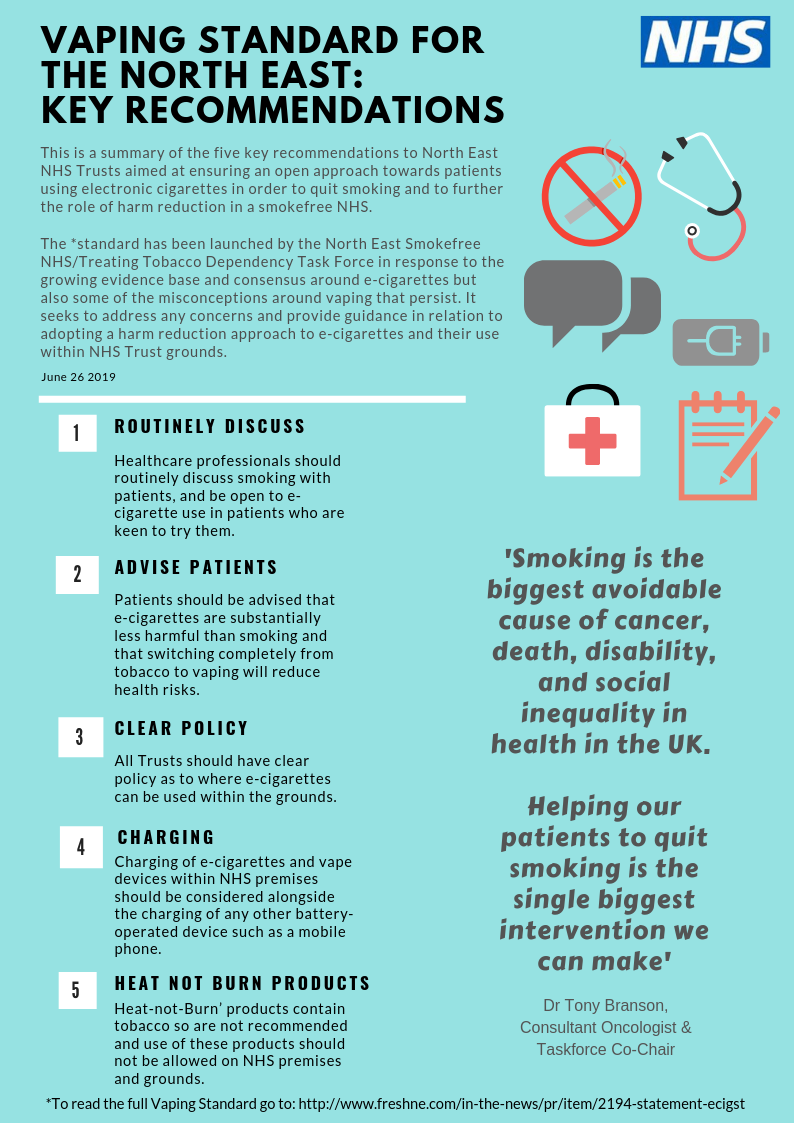Launch of the North East Vaping Standard
HEALTHCARE professionals in the North East are being encouraged to be open to patients switching to vaping to quit smoking as part of a new Vaping Standard designed to tackle the appalling burden of death and disease caused by tobacco.
The North East Smokefree NHS and Treating Tobacco Dependency Taskforce has provided five key recommendations to NHS Trusts aimed at a consistent position around vaping to adopt a harm reduction approach to e-cigarettes and their use within NHS Trust grounds. This is part of the Taskforce work to implement National Institute for Health and Care Excellence (NICE) guidance on smoking in Acute NHS services by April 2020. It recognises that smoking is not a lifestyle choice but is a chronic relapsing long term condition and within the NHS should be treated as such.
The Vaping Standard comes a year after the Royal College of Physicians (RCP) published a major report “Hiding in Plain Sight” which called for hospitals nationwide to ensure all smokers are provided with support to quit from the moment they are admitted. The RCP report recommended allowing e-cigarettes to be used on NHS sites to help smokers trying to quit and to sustain smoke-free policies.
{video}local|images/videos/NEVapingStandardLOWRES.mp4|images/PR_and_news/images/videos/NEVapingStandardLOWRES.mp4|TheNEVapingStandard{/video}
Dr Tony Branson, clinical lead for the Northern Cancer Alliance, who co-chairs the North East Smokefree NHS and Treating Tobacco Dependency Taskforce (alongside Professor Eugene Milne, Director of Public Health, Newcastle), said: “Smoking is the biggest avoidable cause of cancer, death, disability, and social inequality in health in the UK. Helping our patients to quit smoking is the single biggest intervention we can make.
“Medication such as nicotine replacement therapy (NRT) doesn’t contain the harmful chemicals of tobacco smoke and is an important part of many patients’ quitting journeys. But similarly with e-cigarettes there is no smoke, no tar and no carbon monoxide. E-cigarettes are now proving more popular than NRT and it important that we get across to patients the short-term and longer-term health benefits from quitting smoking tobacco including the positives of switching.”
He added: “The NHS has a crucial role to play around prevention and our Hospital Trusts are making significant progress in the North East but this is a journey that will take time and we still have a way to go. We look forward to the day all smokers, everywhere, will be offered effective support to treat their tobacco dependency.
Joanna Feeney, Smokefree NHS Strategic Manager based with Fresh, funded by the Northern Cancer Alliance commented:”The fact that all the Hospital Trusts in the North East are committed to Smokefree NHS and the progress they have made has been excellent, but we also need to recognise that 80% of all health care takes place in GP surgeries and the vital role that primary care can play. A simple 30 second message given in a surgery can be enough to trigger someone quitting smoking and ultimately saving their life.”
The Royal College of Physicians has concluded that the hazard to health arising from long-term e-cigarette use is unlikely to exceed 5% of the harm from smoking, and switching completely from smoking to vaping conveys both substantial short-term and longer-term health benefits. The RCP has stated: “in the interests of public health it is important to promote the use of e-cigarettes, NRT and other non-tobacco nicotine products as widely as possible as a substitute for smoking in the UK.”
Dr Sanjay Agrawal, chair of the Royal College of Physicians Tobacco Advisory Group, said: “Smoking remains the biggest single preventable cause of illness and death and treating tobacco dependency is one of the key priorities in the NHS Long Term Plan.
“E-cigs have been shown to double the effectiveness of quitting compared to other forms of NRT and should be embraced as an effective treatment for tobacco dependency and support a Smokefree NHS, as proposed by the North East Smokefree NHS taskforce Vaping Standard.”
The NE Vaping Standard:
1. All Health Care Professionals should routinely discuss smoking with patients, including relative risks of continuing to smoke, and be open to e-cigarette use in patients who are keen to try them.
2. Patients should be advised that e-cigarettes are deemed to be substantially less harmful than smoking and that switching completely from tobacco to e-cigarettes will substantially reduce health risks. Using e-cigarettes without stopping smoking (dual use) does not provide health benefits; anyone who is using both should be strongly encouraged to stop smoking tobacco as soon as they can.
3.E-cigarette use does not meet the legal or clinical definition of smoking and there is no evidence of harm from exposure to second hand Vape. E-cigarettes are almost exclusively used by smokers and ex-smokers to help smokers stop smoking and stay Smokefree. Vapers should not be required to use the same space as smokers. All Trusts should have clear policy as to where e-cigarettes can be used within the grounds.
4. There are no known additional specific risks to charging e-cigarettes– the risks associated with charging e-cigarettes and vape devices should be considered alongside the charging of any other battery-operated device such as a mobile phone.
5. Patients should be advised that ‘Heat-not-Burn’ products contain tobacco, so are not recommended and use of these products should not be allowed on NHS premises and grounds

